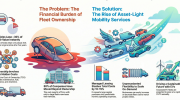В постоянно меняющемся мире автомобилей немногие бренды смогли так же сохранить наследие инноваций и практичности, как Toyota. Известная своими надежными автомобилями и передовым дизайном, компания постоянно адаптируется к меняющимся предпочтениям потребителей. Одной из самых интригующих моделей в линейке Toyota был iQ — компактный автомобиль, призванный переосмыслить городское вождение. Но по мере того, как меняется автомобильный ландшафт, многие задаются вопросом: производит ли Toyota iQ до сих пор?
Краткая история Toyota iQ
Выпущенный в 2008 году, Toyota iQ был разработан как городской автомобиль, предлагающий компактное решение для городских жителей. Его уникальный дизайн позволял с комфортом разместить четырех пассажиров, сохраняя при этом удивительно малые габариты, что делало его идеальным для передвижения по узким городским улицам и парковки в ограниченном пространстве. IQ славился не только своими размерами, но и топливной экономичностью и инновационными инженерными решениями.
Оснащенный 1,0-литровым трехцилиндровым двигателем, iQ предлагал экономичный расход топлива, который понравился экологически сознательным потребителям. Дизайн автомобиля также стал свидетельством приверженности Toyota принципам устойчивого развития, поскольку он отличался низким уровнем выбросов, соответствующим строгим экологическим стандартам.
Прекращение производства
Несмотря на первоначальный успех и позитивный прием, Toyota iQ с трудом нашла себе место на конкурентном автомобильном рынке. В 2014 году Toyota приняла трудное решение прекратить выпуск iQ на большинстве рынков, сославшись на падение продаж и изменение предпочтений потребителей в сторону более крупных автомобилей.
Хотя iQ все еще был доступен в некоторых регионах, таких как Япония и некоторые части Европы, становилось все более очевидным, что эта модель больше не соответствует стратегическому видению Toyota. Рост популярности внедорожников и кроссоверов существенно изменил потребительский спрос, что привело к постепенному отказу от более компактных городских моделей, таких как iQ.
Текущее состояние Toyota iQ
С 2023 года Toyota официально прекратила производство iQ. Компания сосредоточила усилия на разработке новых моделей, отвечающих растущему спросу на гибридные и электрические автомобили, а также на более крупные семейные автомобили. С ростом популярности таких моделей, как Toyota C-HR и RAV4, iQ стал пережитком ушедшей эпохи в автомобильном дизайне.
Хотя iQ больше не выпускается, его влияние на автомобильную промышленность ощущается и сегодня. Многие производители взяли пример с инновационного дизайна и компактной эффективности iQ, что привело к появлению новой волны городских автомобилей, стремящихся максимально увеличить пространство без ущерба для комфорта.
Toyota iQ, возможно, больше не входит в линейку бренда, но он сыграл решающую роль, демонстрируя важность адаптивности в автомобильном дизайне. Поскольку городская среда продолжает меняться, а спрос на экологичные транспортные решения растет, уроки, извлеченные из iQ, несомненно, повлияют на следующее поколение компактных автомобилей. Для поклонников iQ его наследие живет в сердцах тех, кто ценил его необычный шарм и инновационный дух.
Будущее компактных автомобилей
Хотя Toyota iQ официально сошла со сцены, вызванные ею дискуссии о будущем компактных автомобилей далеки от завершения. По мере роста плотности городов и обострения экологических проблем спрос на эффективные малолитражные автомобили становится как никогда актуальным. Автопроизводители сейчас изучают инновационные конструкции, сочетающие компактность с передовыми технологиями, стремясь создавать автомобили, способные адаптироваться к уникальным вызовам городской жизни.
Новые тенденции в городской мобильности
В автомобильной промышленности наблюдается переход к многофункциональным решениям для городской мобильности. Производители все больше инвестируют в электромобили (ЭМ) и гибридные технологии, что соответствует мировому стремлению к устойчивому развитию. Возможно, iQ проложил путь к таким разработкам, подчеркнув потребность в автомобилях, которые не только практичны, но и экологичны.
Кроме того, рост числа сервисов совместного использования транспортных средств, таких как каршеринг и услуги по заказу поездок, изменил восприятие владения автомобилем. Многие городские жители теперь отдают приоритет доступу, а не владению автомобилем, что приводит к росту рынка компактных транспортных средств, которые можно эффективно использовать в совместных автопарках. Эта тенденция подчеркивает важность разработки не только небольших, но и интеллектуальных автомобилей.
Уроки iQ: дизайн и инновации
Toyota iQ стала пионером в области максимального увеличения внутреннего пространства при минимизации внешних габаритов. Принципы ее дизайна повлияли на новое поколение компактных автомобилей, которые теперь оснащаются передовыми технологиями для улучшения впечатлений водителя и пассажиров. Такие функции, как усовершенствованные навигационные системы, возможности подключения и усовершенствованные средства безопасности, становятся стандартными для современных компактных автомобилей.
Более того, наследие iQ служит напоминанием о том, что инновации играют ключевую роль в автомобильной промышленности. Поскольку производители продолжают изучать альтернативные силовые агрегаты и технологии автономного вождения, принципы компактности и эффективности останутся важнейшими в будущих конструкциях.
Путь вперед: можем ли мы ожидать преемника?
Хотя Toyota не планирует в ближайшее время возрождать iQ, потенциал появления преемника остается интригующим. Учитывая меняющуюся динамику автомобильного рынка и растущий акцент на устойчивом развитии, Toyota может выпустить новый компактный автомобиль, отвечающий потребностям современных потребителей, заботящихся об окружающей среде. Поскольку компания продолжает внедрять инновации, дух iQ вполне может вдохновить следующую волну компактных автомобилей.
Toyota iQ, возможно, больше не сходит с конвейеров, но ее влияние находит отклик в автомобильном мире. По мере того, как мы принимаем будущее вождения, уроки, извлеченные из этого уникального городского автомобиля, вероятно, повлияют на дизайн и функциональность компактных автомобилей на долгие годы вперед. Приверженность Toyota к эффективности и городской мобильности продолжает развиваться, будь то посредством новых моделей или инновационных технологий, гарантируя, что наследие iQ не будет забыто.
В конечном итоге вопрос заключается не только в том, продолжает ли Toyota выпускать iQ, но и в том, как принципы, лежащие в его основе, сформируют автомобили завтрашнего дня. По мере того, как меняются городские ландшафты и предпочтения потребителей, автомобильная промышленность стоит на перепутье, готовая принять будущее, в котором ценится компактность без ущерба для инноваций.

